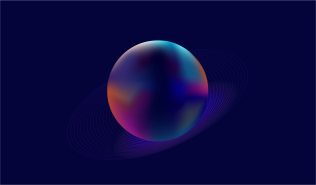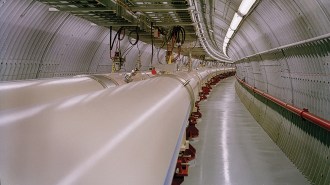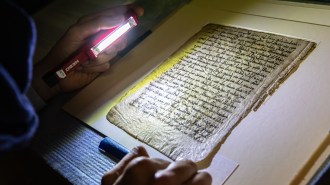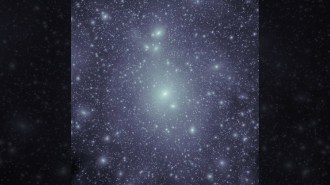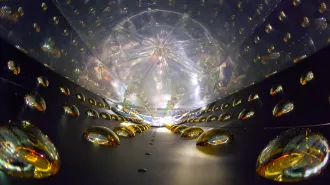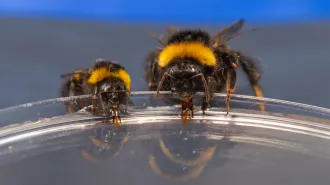John Wheeler (1911-2008)
Quantum theory poses reality’s deepest mystery
By Science News
- More than 2 years ago
Before his death in April, John Archibald Wheeler was one of the few remaining living legends of physics, from the generation born before the development of quantum mechanics. Wheeler collaborated with Niels Bohr, conversed often with Albert Einstein and was the doctoral professor of Richard Feynman. As a young man Wheeler worked on nuclear fission and the development of the atomic bomb. He then turned to Einstein’s theory of general relativity, pioneering its use in understanding black holes (the name that Wheeler coined in 1967). In his later years Wheeler turned his inquisitive powers to quantum physics, devising imaginative experiments that helped to show how quantum reality undermines the old commonsense ideas of the universe as a predictable machine. Wheeler never gave up wrestling with quantum theory’s implications for the nature of reality. In interviews beginning more than 20 years ago, he articulated some of his thoughts on such matters, excerpted here. —Tom Siegfried
You remember the words of Leibniz: This world may be a dream. And existence may be an illusion. But to me, this dream or illusion is real enough if by using reason well we are never deceived by it. It really doesn’t say very much except that what we all know — it’s real enough.
But then there’s the other side of it, what this quantum business teaches us….
The world as a machine implies that there are a lot of questions we can’t ask. How the machine got there, what kind of a steel press it was that pressed out the parts of it and when was the manufacture accomplished. A lot of crazy questions go with that picture. If, on the contrary, you say that everything was a matter of information, then your focus is not on machinery but on communication, which is after all how we get our knowledge — if not communication from person to person, sometimes communication from a wang or bang or hit. And that question of communication [raises] interesting things in the realm of information theory, and it looks and smells as if there will be a connection with quantum theory in the end…. It gives you the feel that you’re getting hold of some new mathematics that may allow you to build up a whole structure, based on integers, based on information theory. But then how does it hook into physics as we know it? That’s where the big missing gap is….
We have to learn how to use our words. It’s a fantastic thing — we humans are so easily trapped in our own words. The word time, for instance — we run into puzzles about the concept of time and then we say, oh, what a terrible thing. We don’t realize we’re the source of the puzzles because we invented the word….
There’s this business about [Niels] Bohr and his nice old professor [Harald] Høffding about the electron passing through the double-slit experiment [in which an electron apparently is able to pass through both slits in a barrier instead of choosing to go through only one or the other]. Bohr in his younger days, in 1927 I guess it was, was visiting Høffding in the company of [Hendrik] Casimir who had come to study with Bohr at Copenhagen. Høffding said, “In this double-slit experiment, where can the electron be said to be?” Bohr said, “To be? To be? What does it mean to be?”…
We’ve learned, I think, that we have to say that that is the kind of question we shouldn’t be asking. Yet to say it’s the kind of question we shouldn’t be asking means that we have to accept a picture of the world different from what we’ve been accustomed to in the past, where we thought of something as chugging along that, every step of the way, you could put your finger on. We realize now that it’s a wrong way of speaking, that it hasn’t happened until it’s been registered. You have no right to talk about where the electron is during that time….
Some people get more and more uncomfortable as they discover what quantum theory really is and what it says…. Einstein had discomfort with a world of that kind. As he said in the last talk he ever gave in his life, speaking to my students in a relativity seminar, “If a person, such as a mouse, looks at the universe, does that change the state of the universe?” He wanted to think of the universe as existing “out there.”
Quantum theory is the deepest part of our knowledge of nature and the biggest mystery…. I think it’s gradually teaching us to ask the right questions…. The only point is, will so many points of view develop that we have a disarray because it’s hard to nail it down?… You get all kinds of people writing all kinds of papers with all kinds of philosophical views and backgrounds. But if you have some really sound people talking about it, I think you’ll get really sound advances….
My feeling is that in this show, the territory we’ve got to get into is so broad that the only thing to do is to plunge into it and start making tracks, no matter if the track is leading into a swamp. You’ll find out.

